|
|
|
Sort Order |
|
|
|
Items / Page
|
|
|
|
|
|
|
| Srl | Item |
| 1 |
ID:
130006
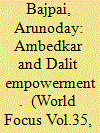

|
|
|
|
|
| Publication |
2014.
|
| Summary/Abstract |
Dr B R Ambedkar was convinced that unless the marginalized sections of Indian society secured the political power, it was not possible to completely wipe out all social, legal and cultural disabilities, from which they suffered (Desai: 1959). Thus, for the political organization and political mainstreaming of Dalits, he pleaded for their representation in legislatures in the Round Table Conferences, 1930-32, convened by the British government. Both Ambedkar and British government supported Dalit representation in the legislatures on the basis of separate electorate, which meant that in the reserved constituencies only Dalits would be allowed to vote. This was the crux of Communal Award announced by the British government in 1932.
|
|
|
|
|
|
|
|
|
|
|
|
|
|
|
|
| 2 |
ID:
166714
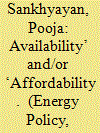

|
|
|
|
|
| Summary/Abstract |
While access to cleaner fuel is a sustainable development goal, the transition from traditional to modern fuel is yet to be achieved in India. This paper estimates fuel costs associated with such transitions and analyses the determinants of access to electricity for lighting and Liquified Petroleum Gas (LPG) for cooking. State-level regression models based on data from 61st (2004–05), 68th (2011–12) and 71st (2014) rounds of National Sample Survey are used. While energy expenditures are found to be comparable for kerosene and electricity for lighting, it increases 3.6–8.8-fold for transition to LPG from traditional fuel. Availability is important for greater uptake of electricity i.e. higher rate of electrification helps, but the same is not true for LPG. While untargeted tariff-subsidy leads to significant budgetary pressure, it doesn't affect the access. States with higher income and literacy rate/women empowerment have greater access to LPG and electricity. This shows while Indian energy policies always focused on removal of supply-side barriers through infrastructure creation, removal of first cost barrier and subsidizing tariff, a more meaningful way to ensure access is perhaps to integrate energy policies within the broader arena of comprehensive development policies to ensure improvement in socio-economic indicators.
|
|
|
|
|
|
|
|
|
|
|
|
|
|
|
|
| 3 |
ID:
102627
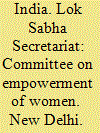

|
|
|
|
|
| Publication |
New Delhi, Lok Sabha Secretariat, 2009.
|
| Description |
7p.
|
| Series |
Parliamentary procedure abstract series; 21
|
|
|
|
|
|
|
|
|
|
|
|
Copies: C:1/I:0,R:1,Q:0
Circulation
| Accession# | Call# | Current Location | Status | Policy | Location |
| 055704 | 328.404/IND 055704 | Main | On Shelf | Reference books | |
|
|
|
|
| 4 |
ID:
124453
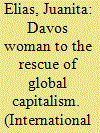

|
|
|
|
|
| Publication |
2013.
|
| Summary/Abstract |
The World Economic Forum (WEF) is a global governance actor that has in recent years taken an increased interest in issues pertaining to gender equality and women's empowerment. The paper critically investigates the work of the WEF in this area, suggesting that WEF-produced gender and development discourse is profoundly compatible with the politics and practices of neoliberalism-not least in the way in which it aligns gender equality and women's empowerment with national economic competitiveness. This is, furthermore, a distinctly postfeminist reading of gender that rests upon the production of neoliberal-compatible female subjectivities-such as "rational economic woman" or "Davos woman"-who emerge as those in society best able to deliver fair and sustainable economic growth (effectively rescuing global capitalism from the excesses of hypermasculine crisis capitalism). The framing of the case for gender equality and women's empowerment in these terms is powerful and may well be an effective way for gender advocates to present their demands. But by analyzing not only how the WEF has framed/represented gender issues but also what has been left out of this representation, the paper points to the way in which simplistic representations concerning the contribution that women make to economic competitiveness disguise the double burdens and gendered structures of socioeconomic inequality that are central to the widening and deepening of the market into all spheres of social life under conditions of roll-back neoliberalism.
|
|
|
|
|
|
|
|
|
|
|
|
|
|
|
|
| 5 |
ID:
141344
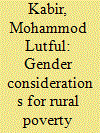

|
|
|
|
|
| Summary/Abstract |
UNICEF (2010), ADB (2011) and GOB (2011) reports reveal that Bangladesh has made significant progress in its social development areas; however, it still lack behind to eradicate poverty and sustain its social development. An initiative, rural non-farm economy (RNFE), has been introduced in Bangladesh to address poverty, social development and to empower rural women financially. RNFE has made contribution to match male–female parity in work participation and also to attain economic empowerment for women by enabling them to engage in economic activities without violating the social norms. The study indicates that women RNFE participants should get more income support and better health care facilities to maintain their subsistence and to get rid of poverty, while men RNFE participants should get more support to get involved in high-income RNFE activities and promote RNFE income growth.
|
|
|
|
|
|
|
|
|
|
|
|
|
|
|
|
| 6 |
ID:
130501
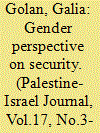

|
|
|
|
|
| Publication |
2011.
|
| Summary/Abstract |
The Van Leer Program on Women in Public Life recently held a discussion on gender perspectives on issues in the Israeli-Palestinian conflict. Women dealt with the core issues of the conflict, namely borders, settlements, refugees, etc. in an attempt to determine if a gender perspective would add or otherwise change the negotiators' approach to these issues. This was not the often-held discussion on women and peace or whether or not women are more peace-loving than men, but rather an effort to see if a look at the issues through a different lens might produce a different approach or suggest something not noticed before. One of these issues is that of security arrangements - an area generally perceived to be the exclusive domain of former military or security figures, most of whom are male.
|
|
|
|
|
|
|
|
|
|
|
|
|
|
|
|
| 7 |
ID:
131795
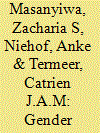

|
|
|
|
|
| Publication |
2014.
|
| Summary/Abstract |
Increasing participation in decision-making processes by service users is one of the objectives of decentralisation reforms in Tanzania. The argument is that decentralisation enhances participation by all sections of the community, and by women in particular, and results in decisions that better reflect local needs. This paper examines the impact of decentralisation reforms on service users' participation for delivery of water and health services in rural Tanzania, using a gender perspective and principal-agent theory. The paper investigates how decentralisation has fostered spaces for participation and how men and women use these spaces, and identifies factors that constrain or encourage women's participation. It shows that decentralisation reforms have created spaces for service users' participation at the local level. Participation in these spaces, however, differs between men and women, and is influenced by the socio-cultural norms within the household and community. Men have gained more leverage than women to exercise their agency as principals. Women's participation is contributing to addressing practical gender needs, but strategic gender needs have been less adequately addressed because gendered power relations have been largely untouched by the reforms.
|
|
|
|
|
|
|
|
|
|
|
|
|
|
|
|
| 8 |
ID:
133444
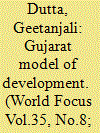

|
|
|
|
|
| Publication |
2014.
|
| Summary/Abstract |
The Gujarat model of development, also known as Modinomics or Modi Model, is not about Gujarat's growth alone but development too. Its vibrant industries, perceptible improvement in social sectors, is a story of education, health, water, electricity and roads. It is a story of how the benefits have trickled down and how deprived segments have been streamlined. The Gujarat model, so to speak, has implications for other states too, since it is about governance, efficient public expenditure, decentralization and participatory planning.
|
|
|
|
|
|
|
|
|
|
|
|
|
|
|
|
| 9 |
ID:
142511
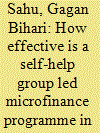

|
|
|
|
|
| Summary/Abstract |
Drawing upon recent data, this paper explores the relationship between women’s involvement in Self-Help Group (SHG) based microfinance programmes and their empowerment. The composite empowerment indicator shows that only 13.2% of women associated with microfinance are empowered. The paper finds that though the length of membership in SHGs increases the intensity of women’s economic and political empowerment, it does not show a significant relationship with their social empowerment. It is also observed that ‘economic empowerment’ does not necessarily lead to the attainment of social and/or political empowerment. The paper argues that although SHG-led microfinance programmes have the potential to empower women in some aspects, their capacity in ushering social transformation is limited.
|
|
|
|
|
|
|
|
|
|
|
|
|
|
|
|
| 10 |
ID:
130484
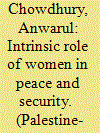

|
|
|
|
|
| Publication |
2014.
|
| Summary/Abstract |
International Women's Day in 2000 was an extraordinary day for me, and will remain so for the rest of my life. That day, I had the honor of issuing on behalf of the United Nations Security Council in my capacity as its president a statement that formally brought to global attention the unrecognized, underutilized and undervalued contribution women have been making towards the prevention of wars, peace-building and engaging individuals and societies to live in harmony. The members of the Security Council recognized that peace is inextricably linked with equality between women and men, and affirmed the equal access and full participation of women in power structures and their full involvement in all efforts for peace and security.
|
|
|
|
|
|
|
|
|
|
|
|
|
|
|
|
| 11 |
ID:
130488


|
|
|
|
|
| Publication |
2014.
|
| Summary/Abstract |
For advocates of United Nations Security Council Resolution 1325 on women, peace and security, the 10th anniversary of the resolution in October 2010 2011was no longer an occasion to sing praises to the resolution. We all know that UNSCR 1325 is important. We all know that it is groundbreaking and game-changing. We have heard all of that from the UN, from member states and even from our fellow civil society actors year in and year out in the last 10 years.
What many of us have decided to do was to take stock of where the world is in terms of the actual implementation of the resolution and the push for real commitments and concrete actions - commitments that would not be long on promise but short on implementation. So where are we in terms of actual implementation 10 years on? Members and partners of the Global Network of Women Peacebuilders (GNWP) conducted in-country monitoring of UNSCR 1325's implementation in Afghanistan, Burundi, Canada, the Democratic Republic of Congo, Fiji, Nepal, the Netherlands, the Philippines, Rwanda, Sierra Leone and Uganda, using a set of common indicators they selected and developed.
|
|
|
|
|
|
|
|
|
|
|
|
|
|
|
|
| 12 |
ID:
184430
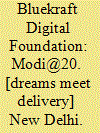

|
|
|
|
|
| Publication |
New Delhi, Rupa Publications India Pvt Ltd, 2022.
|
| Description |
xviii, 439p.hbk
|
| Standard Number |
9789355203649
|
|
|
|
|
|
|
|
|
|
|
|
Copies: C:1/I:0,R:0,Q:0
Circulation
| Accession# | Call# | Current Location | Status | Policy | Location |
| 060162 | 923.2/BLU 060162 | Main | On Shelf | General | |
|
|
|
|
| 13 |
ID:
187087
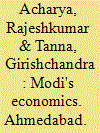

|
|
|
|
|
| Publication |
Ahmedabad, Nanoland Publishers, 2020.
|
| Description |
238p.pbk
|
| Standard Number |
9788193498323
|
|
|
|
|
|
|
|
|
|
|
|
Copies: C:1/I:0,R:0,Q:0
Circulation
| Accession# | Call# | Current Location | Status | Policy | Location |
| 060223 | 338.954/ACH 060223 | Main | On Shelf | General | |
|
|
|
|
| 14 |
ID:
126669
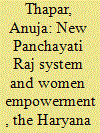

|
|
|
| 15 |
ID:
130509
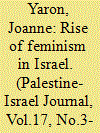

|
|
|
|
|
| Publication |
2011.
|
| Summary/Abstract |
what we know today as the state of Israel was not really established as an independent state in 1948 following what is called the "war of independence. It was established slowly, step by step, by waves of Jewish Immigration to what was then know as Palestine, a province of the fading Ottoman Empire. At the time, the main source of this immigration were Czarist Russia and the United Kingdom.
|
|
|
|
|
|
|
|
|
|
|
|
|
|
|
|
| 16 |
ID:
129651
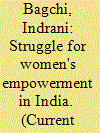

|
|
|
|
|
| Publication |
2014.
|
| Summary/Abstract |
The young woman was caught by tribal elders of the village, apparently in the company of a Muslim man. She was no ordinary tribal woman-driven by poverty, she had left her sleepy village in the Birbhum district of West Bengal state to live and work in a big city. Now she had a sizable disposable income. The
panchayat (tribal elders council) demanded that she pay a fine for being seen with a Muslim man. The man paid up. She refused. The panchayat ordered that she be tied up and gang-raped by 11 men. The "punishment" was as much for the fact that she had rejected the lot of the women in the village as for her entanglement with a Muslim man. It was intended as a warning to other women who might contemplate similar relationships. This happened on January 21, 2014. All the men, including the headman of the village, have been arrested; the district police chief
|
|
|
|
|
|
|
|
|
|
|
|
|
|
|
|
| 17 |
ID:
130500
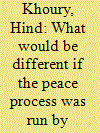

|
|
|
|
|
| Publication |
2011.
|
| Summary/Abstract |
Upon first reflecting on the topic under discussion - "What would be different if the peace process was run by women" - I thought it to be an indirect expression of a deep frustration with the peace process. Many observers and stakeholders worldwide realize that if the process is not entirely dead, it is undoubtedly breathing its last breath.
|
|
|
|
|
|
|
|
|
|
|
|
|
|
|
|
| 18 |
ID:
130502
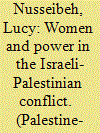

|
|
|
|
|
| Publication |
2011.
|
| Summary/Abstract |
Women need to take their power, reconnect on issues of real concern about the future of the region, for both men and women, and take the lead in reframing the approach to security. The situation here is undeniably stuck. It is also unsustainable, and a secure, peaceful and prosperous future for Palestinians and Israelis seems not only highly improbable but also a vision that eludes the imagination. What is more, women seem to be becoming less rather than more visible in the search for this future. Wars begin in the minds of men - so therefore does peace, and so do all our possible futures, stable or unstable, violent or without violence. Peace and wars also therefore begin in the minds of women, so, as women, we need to start to think about the future we would like, and about what power we have to actually make a difference, and how we are going to use that power to bring about a sustainable and prosperous peace. There is clearly a need for new mindsets, for more ideas and creativity. The involvement of women in both formal and informal peace discussion is one of the few ways that traditional mindsets, such as those focused on fear and military security, that are such a major part of the problem, can be transformed. If women are included at all levels of peace talks, and there is a truly gendered approach - with equal representation and respect for the concerns of all members of society - perhaps we could at least be on our way to a sustainable future. We need to start by working with our minds and our creativity, and from our perspective as women. We need to imagine and consider the different options for the future, even if these are all difficult and no longer very desirable, given the compromises that must be involved, and we must insist that our points of view and ideas be heard and acted upon.
|
|
|
|
|
|
|
|
|
|
|
|
|
|
|
|
| 19 |
ID:
153151
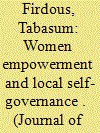

|
|
|
| 20 |
ID:
164924
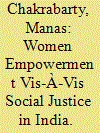

|
|
|
|
|
| Summary/Abstract |
Women occupy a pivotal position in the society. They may be considered as a shining planet in the family round which the entire family revolves. They play a very important role in the society. But throughout the history of the world, their role and importance have been underestimated. We have stepped in the 21st century but even today they are in most cases home makers. It is known to us that Women empowerment is basically the result of various movements and theories.
|
|
|
|
|
|
|
|
|
|
|
|
|
|
|
|
|
|
|
|
|